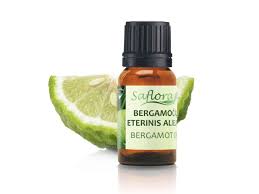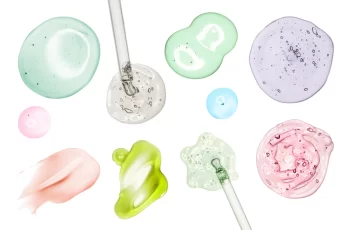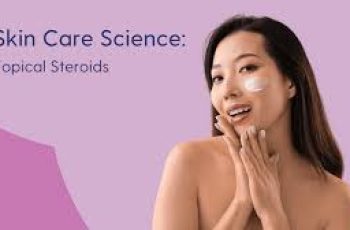
Bergamot oil in skin care
Bergamot (Citrus bergamia) is a citrus fruit from the Mediterranean that has been used perfumes and cosmetics since the early 18th century. (1)
It is also referred to as “oil of bergamot.”
It contains significant antioxidant, anti-inflammatory, and antiapoptotic compounds. (2,3)
Bergamot oil can be found in many products like fragrances, vitiligo treatments, and cleansers of all kinds.
Using this oil in the sun can be dangerous, as bergamot has been observed to cause and increased risk of sunburn.
To find out if bergamot is right for your skin, take our quiz and shop by your Baumann Skin Type!
This blog covers the facts of bergamot oil in skin care so you can decide if it’s right for your skin!
What is a bergamot?
A bergamot is often also called a sour orange; they’re wrinkly, green, and grown on trees. They grow along the coast of the Mediterranean sea.
Bergamot was most likely created as hybrid between lemons and bitter oranges.
The essential oil derived from bergamot is very useful in many skin care products because it is anti-inflammatory, anti-aging, and used to treat hypopigmentation disorders such as vitiligo.
Bergamot is the primary ingredient in Earl Grey Tea!
It is found in candles, perfumes, colognes and aftershave lotions because of its pleasing aroma.
How is bergamot oil extracted?
Bergamot oil is pressed from the skin and pulp of the bergamot fruit, and its extraction is very similar to that of lemon, lime, or even rose oils.
The fruit is generally cold pressed, then left unrefined to leave the natural active compounds intact.
Since bergamot has high amounts of antioxidant and antimicrobial compounds, it has a long shelf life.
benefits of bergamot
Bergamot benefits
Bergamot is not a typical oil as it contains no lipids; otherwise, it has many beneficial compounds and functions such as:
Anti-inflammatory
Antioxidant
Sebum regulation
Collagen production
Hair growth
Stimulation of melanocytes to make pigment
Skin lightening
Wound healing
Some studies have even shown bergamot extract and essential oil may reduce blood pressure and improve mental conditions.(9)
Acne
Bergamot oil can be a good ingredient for acne treatments. It is commonly found in acne treatment cleansers.
It is safer to use in cleansers than in leave on acne treatment products because cleansers are rinsed off before going into the sun.
In a study examining acne treatments on hamsters, bergamot was demonstrated to significantly slow down the growth of the skin’s sebaceous glands (the structures that produce oil inside your skin). (2)
The pressed essential oil form of bergamot was found more effective in acne treatments than its raw juice.
As an antimicrobial, bergamot also assists in the treatment and prevention of acne by eliminating acne causing bacteria on the skin.
It is not comedogenic, which means it does not clog pores on its own and can be used on acne prone skin depending on your skin type.
However, other acne treatments such as retinoids and benzoyl peroxide and salicylic acid are much more effective as acne treatments.
Aging
One study showed increases in production of skin collagen as a result of using the oil. (9)
Aging skin has reduced levels of collagen and one of the goals of an antiaging skin care regimen is to increase levels of collagen in the skin.
Although bergamot oil may be a natural way to treat skin aging, it is nt as effective as other antiaging ingredients.
Psoriasis
Bergamot oil can be a natural way to treat psoriasis because of its anti-inflammatory abilities.
One publication in the scientific literature from 2019 found that across 31 studies bergamot was shown to effectively treat psoriatic plaques. (9)
Since bergamot does not contain any moisturizing fatty acids, it should be used alongside a hydrating oil or body moisturizer on psoriatic skin.
Inflammation
bergamot for inflammation
Bergamot may be an effective natural treatment for treating many kinds of inflammation.
A 2017 study focusing on the effects of 10 different essential oils found that bergamot slowed the spread of inflammation. (8)
The same study also found that bergamot was one of just 3/10 essential oils that inhibited proteins involved with inflammation, and demonstrated wound healing abilities.
Bergamot oil is a natural anti-inflammatory found in organic skin care products that might be great for your skin if it’s a part of your custom skin care regimen.
However, it should never be used in the sun.
Hypopigmentation
Bergamot oil has been used to treat hypopigmentation and increase skin tanning.
Never use bergamot oil if you have dark spots on the skin because it can worsen or even cause hyperpigmentation!
Bergamot oil makes the skin extremely sensitive to UV radiation, which means the chances of suffering a sunburn on the skin are increased while using it.
It stimulates melanocytes to make the pigment melanin- leading to pigmentation.
Many perfumes and colognes containing bergamot have been observed to cause discoloration on people’s necks after prolonged use in the sun.
This is one reason people are told to apply perfumes) and colognes to clothing and not directly to the skin.
This is one of the most common causes of darkness in the beard area because it is found in many aftershave products!
Developing dark spots or other kinds of hyperpigmentation from wearing plant extracts in the sun is called phytophotodermatitis.
Vitiligo
It has been used to treat vitiligo for decades because it increases the melanin production of melanocytes when they are exposed to UV radiation. (6,10)
(UVA is a frequent treatment of vitiligo- or is was before we had lasers for that.)
When you have vitiligo, one goal is to tan the light depigmented part of the skin. Bergamot greatly increases the skin’s sensitivity to UV radiation.
Oil of Bergamot is among the most effective natural treatments for vitiligo, but is should be used with caution to prevent skin burning.
Always wash your hands after applying to the depigmented area so you do not burn unintended areas of the skin.
Wounds
Many of the active compounds in bergamot oil have demonstrated wound healing effects in different conditions.
The 3 most significant compounds in bergamot for wound healing are:
Limonene
Linalyl acetate
Linalool
Bergamot and the sun
Side effects
Even though bergamot is a popular and natural ingredient, there are some possible side effects to keep in mind.
Bergamot is a common allergen and irritant on many peoples’ skin.
Bergamot oil increases the skin’s sensitivity to UV radiation, which means a higher likelihood of sunburns and sun damage.
Never use it on the sun unless you are using it to treat vitiligo under the care of a dermatologist.
It can worsen hyperpigmentation disorders such as melasma.
Is bergamot oil safe?
Unless you have a particular allergy or wear it in the sun, it is safe.
The EWG rating for bergamot is “3-5 depending on usage,” which means it is not particularly safe for all people.
The primary factor in this low safety score is that bergamot is a common allergen.
In 2022, a study found that natural preparations containing bergamot, orange, and clove essential oils do not significantly change the skin in any negative way, and are safe for topical use. (13)
That being said, the oil has a high chance of sunburn and skin pigmentation if left on the skin in direct sunlight for prolonged periods of time. It is safe as part of a cleanser and similar products because they are washed off before going outside.
To be sure bergamot is both safe and best for your personal skin type, take our quiz to shop by your Baumann Skin Type.
Take the Quiz
What kind of oil is bergamot
What kind of oil is bergamot oil?
Bergamot oil is derived from a fruit, meaning it is a plant oil. It also carries a strong fragrance and is considered an essential oil.
Though some essential oils can contain various kinds of lipids, bergamot have no active fatty acids. This means bergamot is not a true lipid-based oil.
Bergamot is an essential oil primarily composed of various terpenes that imbue smell, flavor, and different effects depending on the specific compounds.
Active compounds
The most significant active ingredient in bergamot is bergapten, a terpene associated with anti-inflammatory, antimicrobial, and anticancer behaviors. (4)
Bergapten has also been studied to alleviate significant psoriatic lesions, treating vitiligo, and it is effective in hypolipemic therapy. (5,6,7)
Bergapten is also known as 5-methoxypsoralen. (4) Psoralens are well known to increase the risk of sunburn by making skin sun sensitive.
Fresh juice from bergamot have been analyzed as possessing a few main active compounds such as: (19)
Monoterpenes (limonene)
Linalool
Pigments
Waxes
Coumarins
Psoralenes
Which types of products use bergamot oil?
Because bergamot is so versatile in its active compounds it is used for many skin conditions and concerns.
It can be found in many product types such as:
Cleansers
Face oils
Retinoid serums
Vitiligo treatments
Bergamot oil is not right for everybody, so when you’re shopping for bergamot oil products be sure to look for your skin type octagon on the product page!
Here are some of our favorite skin care products containing bergamot oil.
Take the Quiz
Our articles are all written independently; that means no big companies telling us which products we have to promote. Our recommendations are based on decades of professional experience in research trials and clinical practice.
Our goal is first and foremost to give you the facts and help you find the perfect products and regimen for your individual skin type.
If you enjoyed this blog, here are some similar blogs on plant oils in skin care you might also like:
Borage seed oil
Coconut oil
Evening primrose oil
Jojoba oil
Licorice extract
Rose oil
Rosehip oil
Tea tree oil


